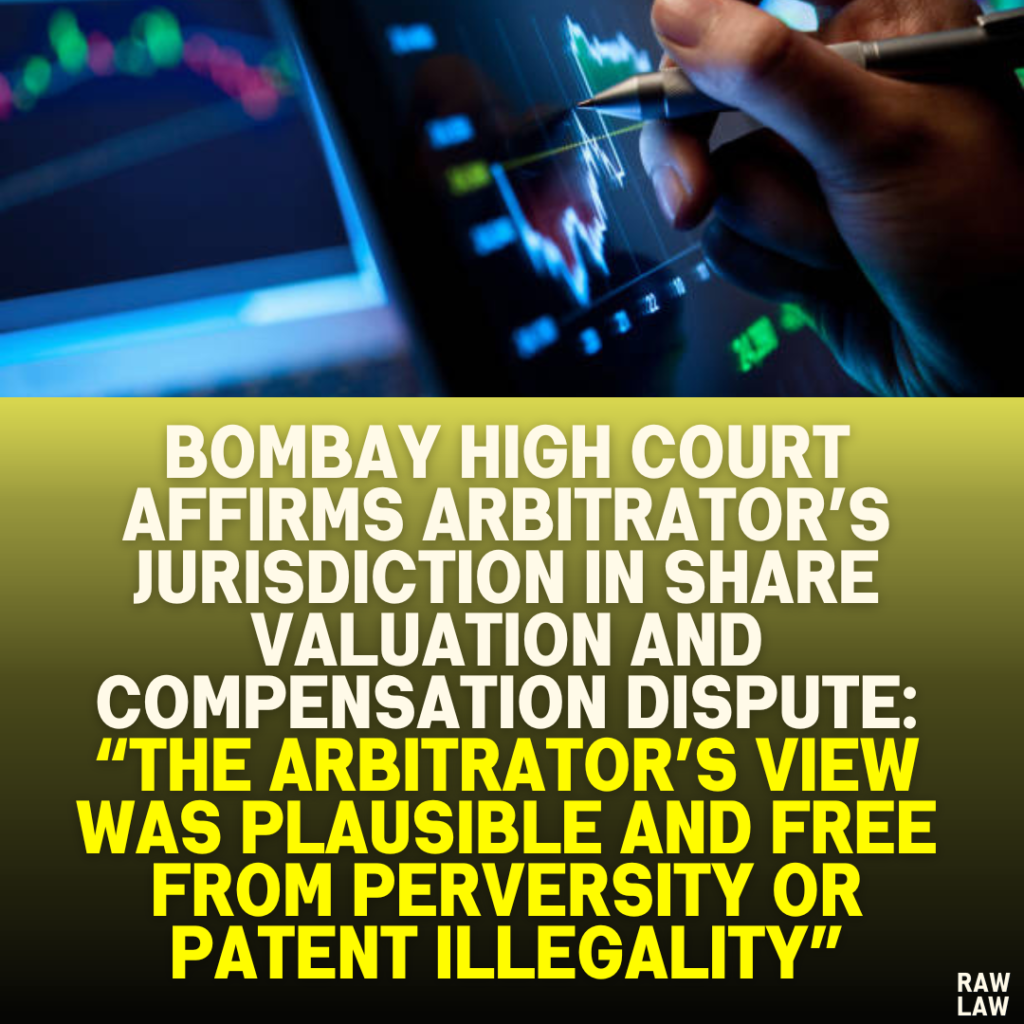1. Court’s Decision:
The Bombay High Court upheld the arbitral award, dismissing the appeal under Section 37 of the Arbitration and Conciliation Act, 1996. The court concluded that the arbitrator’s findings on compensation for specific shares were reasonable and free from perversity or patent illegality. The arbitrator acted within the jurisdiction provided by the arbitration agreement and related terms of reference.
2. Facts:
- The case involved a dispute between the parties over agreements related to the transfer of shares in a company, E-square Leisure Pvt. Ltd.
- The respondents initially sought specific performance of a contract to transfer shares. Subsequently, both parties agreed to restrict the claim to compensation in lieu of specific performance.
- The arbitrator issued an award concerning three categories of shares:
- 7,71,650 shares: Agreed to be transferred under the 2000 agreement.
- 5,00,050 shares: Allegedly handed over as security for premium payments.
- 1,79,770 shares: Addressed under interim consent terms.
The appellants challenged this award, alleging jurisdictional overreach and errors in valuation.
3. Issues:
- Whether the arbitrator exceeded the terms of the arbitration agreement and acted beyond jurisdiction in awarding compensation for the shares.
- Whether the compensation in lieu of specific performance was justified in light of the facts and the conduct of the parties.
- Whether the valuation of shares at ₹94.43 per share was arbitrary or unsupported by evidence.
4. Petitioner’s Arguments:
- Lack of Readiness and Willingness: The appellants argued that the respondents were never ready and willing to perform their obligations, including paying the consideration for shares.
- Jurisdictional Overreach: The arbitrator awarded compensation for 5,00,050 shares without any agreement or terms of reference supporting such claims.
- Faulty Valuation: The valuation of shares at ₹94.43 per share was arbitrary, unsupported by evidence, and contrary to the terms agreed upon.
- Patently Illegal Award: The appellants claimed that the arbitral award was flawed and violated the principles of natural justice and equity.
5. Respondent’s Arguments:
- Reasonableness of Award: The respondents contended that the arbitrator’s decision was well within the jurisdiction and aligned with the parties’ agreements.
- Commercial Interpretation: The correspondence and agreements were reasonably interpreted by the arbitrator, accounting for the commercial realities of the dispute.
- Agreed Compensation Framework: The respondents argued that compensation, instead of specific performance, was expressly agreed upon by the parties during the arbitration proceedings.
- Valuation Justified: The valuation process followed by the arbitrator was consistent with the agreed procedures, and no oral evidence was required as per the parties’ agreement.
6. Analysis of the Law:
- Scope of Judicial Review:
- Under Section 34 of the Arbitration and Conciliation Act, interference with an arbitral award is limited to cases of patent illegality, perversity, or jurisdictional overreach.
- Under Section 37, appellate jurisdiction is even more restricted, focusing on whether the lower court exceeded its jurisdiction in upholding or setting aside an award.
- Key Legal Principles:
- The arbitrator’s interpretation of the agreements and valuation process is considered final unless it shocks the conscience of the court.
- Mere insufficiency of evidence or a better alternative interpretation does not warrant interference.
7. Precedent Analysis:
The court relied on the following cases:
- South East Asia Marine Engineering & Construction Ltd. v. Oil India Ltd.: Limited scope of judicial review under Section 34.
- Delhi Metro Rail Corporation Ltd. v. Delhi Airport Metro Express Pvt. Ltd.: Appellate courts under Section 37 must exercise powers akin to Section 34.
- Renusagar Power Co. Ltd. v. General Electric Co.: Patent illegality must go to the root of the matter.
- MMTC v. Vedanta: Party autonomy and minimal interference in arbitration proceedings.
8. Court’s Reasoning:
- Readiness and Willingness:
- The arbitrator reasonably concluded that the respondents were ready and willing to fulfill their contractual obligations, considering their immediate responses to correspondence and the lack of evidence to the contrary.
- The appellants disclosed the share price (₹20 per share) only 24 hours before the deadline, undermining their claim that the respondents failed to arrange funds.
- Compensation for 5,00,050 Shares:
- Although no explicit agreement existed for these shares, the arbitrator inferred from the evidence that these shares were handed over as security.
- The arbitrator acted within jurisdiction by awarding compensation instead of ordering the return of these shares.
- Valuation:
- The valuation of ₹94.43 per share was based on a summary procedure agreed upon by the parties, and the arbitrator corrected arithmetical errors in the appellants’ valuation reports.
- The court found no arbitrariness or patent illegality in the valuation process.
- Award for 1,79,770 Shares:
- The interim consent award referred to these shares, and the arbitrator’s decision to award compensation for them was consistent with the evidence and agreements.
- Land Compensation:
- The award of ₹1 crore was supported by the agreed valuation of land and the financial settlements made during the arbitration.
9. Conclusion:
The court concluded that:
- The arbitrator’s decisions were plausible, supported by evidence, and aligned with the terms of the arbitration agreements.
- There was no perversity, patent illegality, or jurisdictional overreach in the award.
The appeal was dismissed, and the arbitral award was upheld.
10. Implications:
- This judgment reinforces the sanctity of arbitral awards and the principle of minimal judicial interference.
- It highlights the importance of respecting party autonomy and the scope of arbitration agreements in resolving commercial disputes.




Pingback: Supreme Court Quashes Proclaimed Offender Status: Clarifies Section 174A IPC as an Independent Offense Despite Proclamation's Validity Under Section 82 CrPC - Raw Law
Pingback: Supreme Court Exercises Article 142 Powers to Compound Non-Compoundable Offense Under Section 326 IPC: Reduces Sentence After Voluntary Settlement and ₹5.8 Lakh Compensation to Promote Peace and Harmony - Raw Law